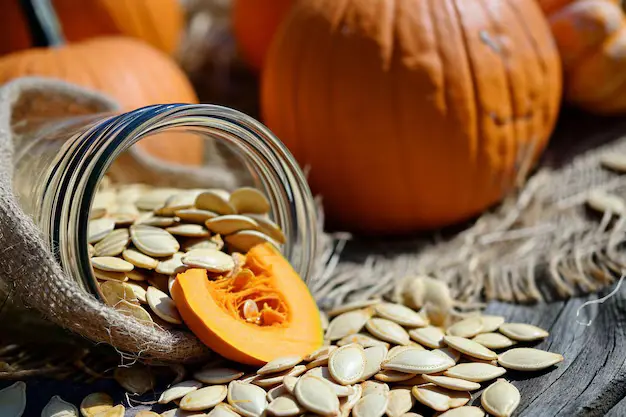Pumpkin seeds (another name pepitatas are small, green, flat seeds that are enriched with nutrients. These seeds are a powerhouse of essential vitamins and minerals, making them a popular choice for health. You can enjoy them raw, roasted, or added to recipes. Pumpkin seeds offer a range of health benefits that make them incredible.
Nutritional Values of Pumpkin Seeds:
Nutritional Values of Pumpkin Seeds (per 1 oz/28 g serving):
- Protein: 7 grams
- Fat: 14 grams
- Saturated Fat: 2.5 grams
- Carbohydrates: 4 grams
- Fiber: 1.7 grams
- Calories: 151 kcal
- Sugars: 0.2 grams and much more
- Also, they are good sources of magnesium, iron, zinc, copper, manganese, phosphorus, potassium and vitamins
Ancient Superfood: “Pumpkin seeds have been consumed for thousands of years. Archaeologists have found evidence of their use dating back to ancient civilizations in Mexico and Central America”
Health benefits of pumpkin seeds:
Healthy Heart
Pumpkin seeds are a valuable addition to your diet for supporting heart health. Enriched with magnesium, which is essential for maintaining normal heart rhythms and aids in reducing blood pressure. A study published in the Journal of Dietary Supplements found that magnesium supplementation from sources like pumpkin seeds can significantly lower systolic and diastolic blood pressure, which reduces the risk of heart disease.
Pumpkin seeds are also high in antioxidants, such as zinc and vitamin E, which help to fight oxidative stress and inflammation that are key contributors to cardiovascular problems. These seeds also contain plant sterols, which can help lower LDL cholesterol levels, further promoting a healthier heart. Incorporating pumpkin seeds into your diet can improve overall cardiovascular health.
Maintains Blood Sugar
Pumpkin seeds are a good choice for people with diabetes or those looking to manage their blood sugar levels. Studies on animals have shown that pumpkins can reduce blood sugar. For example, healthy adults who ate 65 grams of pumpkin seeds with a high-carb meal had lower blood sugar levels afterward.
These seeds are also rich in magnesium, which is believed to help control blood sugar. High magnesium present in it lower the risk of developing type 2 diabetes by 14%.They also help in the loss of weight.
Potential benefits in supporting bladder health
Pumpkin seeds are famous for their potential benefits in supporting bladder health. Compounds like phytosterols and omega-3 fatty acids present in them help improve bladder function and reduce the symptoms of overactive bladder. Pumpkin seed extract can help increase bladder strength and reduce urinary frequency, particularly in individuals with urinary disorders.
High zinc content in pumpkin seeds is believed to support prostate health in men, which can also have a positive impact on bladder function. Incorporating pumpkin seeds into your diet may be a natural way to support a healthier bladder and improve overall urinary health.
Helps to improve sleep
Pumpkin seeds are a natural source of tryptophan, an amino acid that can help promote sleep and consuming 1 g of tryptophan daily is thought to improve sleep quality. Pumpkin seeds are also an excellent source of magnesium and high magnesium levels have also been linked with better sleep.
Beneficial for women
Pumpkin seeds are beneficial for breastfeeding mothers and offer various benefits for both mom and baby. These tiny seeds are packed with essential nutrients like iron, protein, magnesium, and healthy fats, all of which are important for maintaining energy levels and supporting overall health during the breastfeeding period. High zinc content in pumpkin seeds plays an important role in immune function and wound healing, both of which are important for new mothers. Additionally, the healthy fats in pumpkin seeds can help to increase breast milk, potentially aiding in the baby’s growth and brain development.
Also read: All about funnel seeds
FAQS:
Name the key nutrients found in pumpkin seeds?
Pumpkin seeds are rich in essential nutrients, including magnesium, zinc, iron, protein, and healthy fats. They are also enriched with antioxidants, such as vitamin E and carotenoids, as well as a good amount of dietary fiber.
Are pumpkin seeds benefit for heart health?
Pumpkin seeds are known to support heart health due to their high content of magnesium, which helps regulate blood pressure and maintain a steady heartbeat. Additionally, the healthy fats in pumpkin seeds, particularly omega-3 and omega-6 fatty acids, help reduce bad cholesterol levels (LDL) and increase good cholesterol (HDL).
Are pumpkin seeds good for digestion?
Pumpkin seeds are a good source of dietary fiber, which aids digestion by promoting regular bowel movements and preventing constipation. They also contain healthy fats that support the digestive process.
How do pumpkin seeds support immune function?
Pumpkin seeds are rich in zinc, a mineral that plays a crucial role in maintaining a healthy immune system. Zinc helps the body fight off bacteria and viruses and supports the production of immune cells.
Can pumpkin seeds help with weight management?
Yes, the high fiber content in pumpkin seeds helps keep you feeling full for longer periods, which can reduce overall calorie intake. Additionally, the protein and healthy fats in pumpkin seeds provide sustained energy, making them a good snack option for weight management.
What are the potential benefits of pumpkin seeds for men’s health?
Pumpkin seeds are known to support prostate health due to their high zinc content, which is essential for maintaining prostate function. Some studies suggest that pumpkin seeds may help alleviate symptoms of benign prostatic hyperplasia (BPH), a condition that causes an enlarged prostate.
How can pumpkin seeds contribute to bone health?
Pumpkin seeds are an excellent source of magnesium, which is vital for bone formation and the maintenance of bone density. Magnesium works alongside calcium to strengthen bones and prevent conditions like osteoporosis.
. Are pumpkin seeds beneficial for skin health?
Yes, the antioxidants in pumpkin seeds, particularly vitamin E, help protect the skin from damage caused by free radicals. These antioxidants also support skin repair and regeneration, leading to healthier and more youthful-looking skin.
Are there any side effects of consuming pumpkin seeds?
Pumpkin seeds are generally safe to consume, but eating them in excessive amounts may lead to digestive issues such as gas or bloating due to their high fiber content. It’s also important to note that some people may be allergic to pumpkin seeds, so it’s best to consume them in moderation and consult with a healthcare provider


